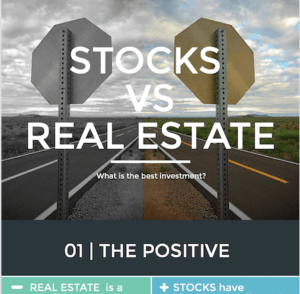There are many different factors that are involved in deciding whether stocks or real estate are the best investments. Both have their pros and cons. That’s why it’s important for individuals to educate themselves about each option in order to make investment decisions that are appropriate for their particular situations.
Real Estate
How it works:
–Choose between commercial and residential real estate.
–Consider your goals with the property. You can take a “home flipping” approach where you’ll buy low-priced, distressed properties, refurbish and sell them for a profit at a higher market value. Or you can buy properties to rent in order to generate a consistent income.
–Be prepared to contribute a down payment of at least 20% of the property.
Pros:
–Tangible good. Can feel more like a real investment.
–History of consistent wealth and long-term appreciation. From 1978-2004, real estate had an average return of 8.6%.
–Depreciation (writing off wear and tear of a commercial property)
–Tax deductions
–Ability to sell through a 1031 exchange and not pay capital gains taxes.
Cons:
–May have to hold for several years before realizing true profit potential
–Closing costs can be expensive after adding in taxes, commissions and fees.
–Real estate prices have tendency to fluctuate
–Difficult to get diversified, unless you invest in a variety of different types of properties, or you have a real estate investment trust. With the latter option, you’re invested in a large portfolio of real estate, and will offer you a dividend as a shareholder.
–Often generates returns that are lower than those of the stock market.
Stocks
How they work:
–Buy into a stock and receive ownership in a company
–Profit when the company does well; lose funds when the earnings of the company drop.
Pros:
–Delivered an average return of 13.4% from 1978-2006, much better than real estate’s 8.6% average.
–Long-term approach and balance in several areas builds net worth at a good rate.
–Stocks are very liquid, quick and easy to sell
–Flexible and can be reallocated into a retirement account tax-free until you start to withdraw the money.
Cons:
–Can be more volatile than real estate, however, especially when the economy or a particular company is facing economic difficulties.
–Can be emotional investments and lead to irrational market decisions
–Bankruptcy is a possibility, in which case your investment dissolves.
The Bottom Line:
Stocks have a clear advantage over real estate in several areas. However, the latter option does offer substantial benefits when it comes to stability and taxes.
A good compromise could be a REIT, or Real Estate Investment Trust. This is a company that owns or finances income-producing real estate. Modeled after mutual funds, REITs provide investors of all types regular income streams, diversification and long-term capital appreciation.
Ultimately, you’ll have to decide what option is best for your personal situation and comfort level. A financial professional can help you analyze different options to arrive at the best decision.
**Source: Investopedia
Click below for an illustration of everything we just covered:








